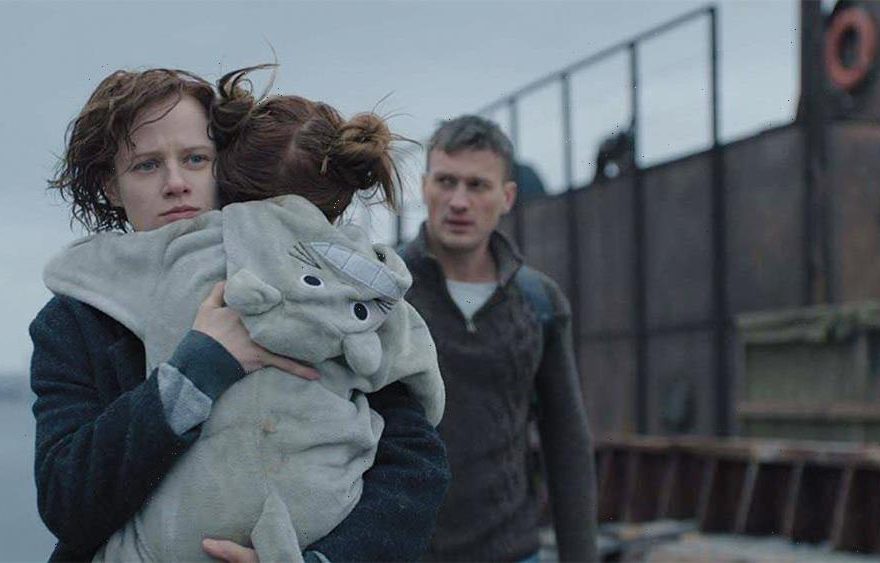Ukraine doesn’t need mercy, pity or condolences, noted Film.UA Group CEO Victoria Yarmoshchuk at MipTV on Monday. What it needs are new projects, international co-operations and jobs for people in the creative sector.
“On the first day of war, we realized that content is our weapon. Ukrainian stories are not local stories; they can be understood everywhere. The best thing the world can do right now is to collaborate with us,” she said.
Representatives of Film.UA Group, Media Group Ukraine, 1+1 Media and StarLightMedia, once rivals for content and viewers, came together in Cannes during a “Stand with Ukrainian Content Industry” session, urging international players to notice their showrunners, producers and writers, ready to work right now.
“We would like to be much more integrated in the international media community once the war ends,” said Inna Filipova, head of sales at 1+1 Media. She used to live in Bucha on the outskirts of Kyiv, where a mass grave has recently been discovered.
“Let’s cooperate, co-produce, co-create and co-develop together. If I would be asked 40 days ago if it’s possible for a country at war, I would say no. Now, we know it’s necessary.”
Opening up about new initiatives, Media Group Ukraine’s Iryna Cherniak said: “We are developing a stand-up format with our host from ‘The Masked Singer’ where, as far as it’s appropriate, we will present humorous analysis of the current events. We will set up a separate form of struggle where the main weapon is the sense of humor.”
Also, with Film.UA Group relocating its post-production and animation services to safer parts of the country, Yarmoshchuk underlined that physical production won’t stop either.
“We have started filming and we will continue. Our competitive advantage is that Ukraine has lived through many severe crises. This one is the worst, but we know how to be productive in unfavorable conditions and how to produce brilliant content for very little money,” she said.
StarLightMedia recently signed a co-development agreement for their TV series ‘Gladiator’ with Croatia, while Film.UA Group pitched their new project “The Border” at Series Mania.
But while capturing international attention is crucial – also thanks to such ideas as the charity marathon “Save Ukraine – #StopWar,” broadcast by Poland’s TVP to over 20 countries – Ukraine’s TV industry also focuses on the local population, “morally and emotionally unprepared” for the conflict.
Quickly joining forces to protect itself from propaganda and assure access to verified information, they launched the United News program, taking turns helming the newscast and asking the world to turn off the broadcasting of Russian channels.
“That was the best way to protect our country,” noted Kateryna Shevelyuk, head of fiction production department at StarLightMedia. But now, providing content for children and a break from non-stop war coverage is also important.
“We are thinking of taking one channel, STB, out of the news marathon to launch the so-called humanitarian support-oriented content,” she said. Among other things, it would feature short programs with a psychologist, also advising people on how to talk to their children about the war.
Encouraging a MipTV audience to be open to Ukrainian content, the participants made sure to mention some of the country’s successes, from crime story “Hide and Seek,” taken for distribution by ZDF and sold to Germany and France, “The Sniffer,” which became the first Ukrainian project picked up by Netflix or animation “The Stolen Princess,” sold to multiple territories, including China.
Victoria Yarmoshchuk also announced a plan to establish a fund, run by an international board, which would accumulate money for the production of Ukrainian content. The partners, who would decide to get involved financially, would then automatically get the content for their platforms and TV channels.
“We see this step as something practical and a way to demonstrate we are not asking for donations – we are asking for cooperation.”
While the project is in early stages, more information will follow on Facebook page “Ukrainian Content. Global Cooperation,” she told Variety after the presentation. Urging A-list festivals, including Cannes, which will soon announce its selection, to ban Russian films.
“A month ago, I would say that culture is apolitical. Now, everything is black and white. Festivals should ban Russian films, at least now, because if the world isn’t united in this fight, people will continue to die. Today, my personal and radical position is that everyone should refuse to have any relations with Russia and those who enable them,” she added.
Also pointing out that while many Ukrainian artists decide to fight, people still need stories.
“After each war, cinema helps to rebuild a nation. We need to work on our stories now, because they will be needed later.”
Source: Read Full Article
